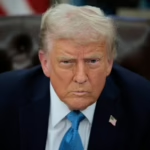The Office of the United States Trade Representative (USTR) has criticized Nigeria’s restrictions on certain imports, saying the policy poses challenges for American exporters seeking to enter the Nigerian market.
This statement comes shortly after former U.S. President Donald Trump announced extensive new tariffs on imports to the U.S., of which Nigerian goods reportedly account for 14 percent.
In a post shared on X (formerly Twitter) on Monday, the USTR drew attention to what it described as “obstacles to fair trade,” emphasizing that Nigeria’s import ban affects a wide range of goods, including agricultural products, pharmaceuticals, beverages, and other consumer items.
“By banning imports such as poultry, pork, beef, juices, medications, and alcoholic drinks, the Nigerian government has created significant barriers for U.S. businesses,” the USTR noted. “These restrictions limit American exporters’ ability to access one of Africa’s largest markets and result in missed economic opportunities.”
The ban, introduced by Nigeria in 2016, was part of a broader effort to reduce reliance on imported goods and protect local industries. The affected items include frozen meat, refined oils, sugar, cocoa derivatives, noodles, fruit juices, bottled drinks, beer, cement, used tyres, soap, sanitary ware, and several paper-based products.
While Nigerian authorities maintain that the import ban is meant to support domestic production, the USTR argues that the move stifles trade and negatively impacts U.S. commercial interests in the region.
In a separate development, Nigeria’s federal government recently announced its intention to suspend the importation of solar panels. The decision, revealed on March 26, 2025, is aimed at encouraging local production and boosting the country’s clean energy sector.












Leave a Reply